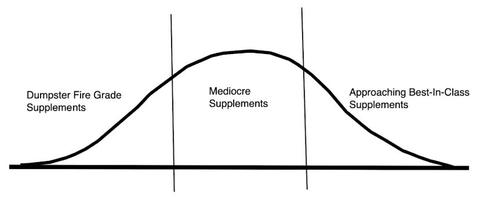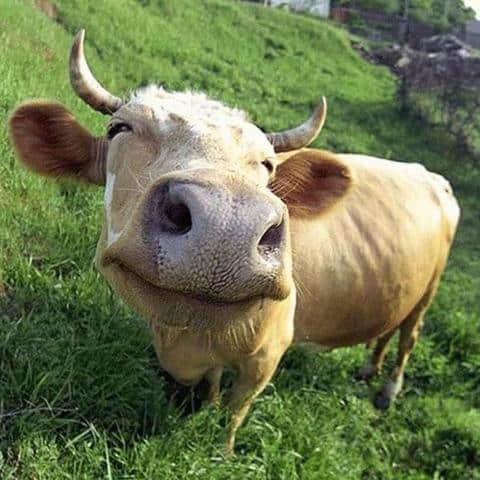Supplement regulations are not what we think they are. There is no one group or organization that checks products before they hit the market. The FDA requires voluntary compliance – meaning a registered company needs to act in good faith.
For the consumer, this means for each type of product, you’ll have lots of variance. Products will be horror shows all the way up to what we call best-in-class. What we’ve found is that it’s kind of like a bell curve; most products fall in a “mediocre” middle while the edges have really great or really poor products.

Unfortunately, figuring out what you have based on the bottle in your hands is near impossible. There are some hints you can get from the labels, but for the most part, consumers just aren’t trained in all the different questions they’d have to ask to ensure their supplement quality is what they think it is.
This is especially true for collagen products. Collagen comes from animal sources, so there are all the issues around the farming methods. How the product is processed will tell you how active or potent the end product is, as well as any potential contaminants that could be in your product without you knowing. Heavy metals, solvents, and all sorts of chemicals can end up in your collagen without you even knowing.
My Favorite Quality Analogy
I’m a bit of a chocoholic, so all my analogies involve cookies or M&Ms. Imagine for a second that we were making chocolate chip cookies. What a vision, right? We’d need to go to a reputable supplier (grocery store) and buy sugar (raw material). We’d look for Domino sugar, as we know that raw material supplier has been regularly inspected and has a long history of proper processes and controls to deliver a consistent, quality raw material.
What if we skipped that process and got our sugar from a guy standing at the Village Green here in Woodstock (the center of town for those of you not from the area). He’s got a brown, crinkled up paper bag that has “SUGAR” written across the front in sharpie. You can visually inspect the bag’s contents: there’s white granular powder in there. It looks like sugar! But think for a moment about ALL the other things that could be there. The list is literally limitless; there could be other white contaminants, heavy metals, solvents, all the fun stuff.
This is just a single consideration around a single ingredient in a very long process. There are a lot of corners a supplement company can cut, and a consumer would never know.
How Collagen Source Affects Quality Considerations
There are 3 main sources of collagen supplements on the market:
- Cows
- Chicken
- Fish
It may be obvious, but I’m going to state it anyway: these are all animals. Animals can be gross. Gross animals make gross animal parts that get into your supplements. What a farmed animal is fed, it’s living conditions, and general care will all influence what trace compounds could be found in your supplement.
The Food
What type of feed an animal gets is a big determinant of the quality of the product made from that animal. Is it grass fed as an animal would be naturally, or is it fed grain to ensure a “proper yield” in size and shape. Grain fed animals tend to eat a corn-rich diet, which tends to be GMO corn (not a problem in and of itself, but a factor that should be disclosed to us). Corn itself could be peppered with pesticides and herbicides. Those get in the animal and on your product.
The Living Conditions
Animals can be jammed into a feedlot where they don’t have room to move around freely and graze. This is not only poor treatment of animals, but it affects the quality of the products coming from animals. We prefer, for all possible reasons, free-range animals who are pasture-fed.
The Chemical Soup
Some animals are packed with harsh, high dose antibiotics to prevent disease. This is a tactic needed in feedlots, where animals are literally on top of each other in each other’s filth.
Besides this, many farmed animals are pumped with hormones to improve their growth and size.
Organic or Not?
We’ve ranted about the organic standards before. The term organic isn’t regulated, so anyone can write organic on their product and it not actually signify anything special. USDA Organic products are definitely better than most poor farm conditions, but the standards products have to meet can change over time. There is a general expansion of what pesticides and herbicides are considered acceptable.

In my opinion, organic certification is a great plus, but i’d prefer the standards of the farms be MORE strict and not certified than certified alone. Especially if the third party test results speak to the quality – the products should be as close to pesticide, herbicide, and contaminant free as humanly possible.
Domestic Or Foreign?
For many raw materials, it’s ideal to have American sources.There is no need, for example, to get grape seed extract from a Chinese source, where the quality standards are probably not being met, when we have PLENTY of domestic sources for the picking. We’re closer, we typically have tighter standards, and there is more scrutiny (we hope).
When it comes to animal care and welfare, the fact is, America doesn’t rank so great. We’ve often looked to New Zealand for bovine sources of raw materials, as their record for animal agriculture and standards is pretty impressive. Brazil, one of the largest exporters of cattle, also has numerous high-end farms where the animals are treated like celebrities.
In the end, it comes down to the details, not the broad strokes.
Potential Contaminants
Heavy metal contamination is a major issue with many supplements. It rains everywhere, and our past (and current) pollution gets into the soil and becomes an unfortunate part of life. Animals feeding in heavy-metal rich soil may have higher than normal levels in end products.
Besides this, the manufacturing process may expose us to contaminants like heavy metals or harmful chemicals. The machines and equipment they use matter, as well as what chemicals and components they use to process and make the product.
For collagen, the animal tissues (their hide or bones) are processed to extract out the collagen. The collagen fibers are then chemically broken down. The product is sterilized and concentrated. Any one of these steps could introduce some chemical residue that could end up on your product.
We have to worry about chemicals, we also have to worry about over processing from a potency standpoint. Degrade protein down too far and it won’t be utilizable.
How To Find A Quality Collagen
To find quality supplements, we have to be ready to ask the tough questions and not settle for easy answers. At the end of the day, transparency wins. A great company will be excited to brag about how good they are doing and will share willingly.
Here’s a little list of things you should look for in a collagen supplement:
- Animals that are antibiotic and hormone-free
- Animals that were pasture-raised and grass-fed
- Processes that use very little chemical solvents
- Minimal processing to ensure product integrity
- Extensive third-party testing for things such as heavy metals, pesticides, herbicides, and potential solvent residue
- Those tests are comprehensive; not just testing for a couple of pesticides but LOTS of them, and the results show levels far below acceptable minimums.
Crazy Quality Collagen
Choosing quality collagen is difficult for consumers. Heck, it’s difficult for me and I know what questions to ask! As with all of this, it comes down to transparency. Look for brands that are transparent in their process. Brands that exceed minimum requirements. Brands trying to make products that are truly best-in-class.
Just trying to keep it real…

Neal Smoller, PharmD
Owner, Pharmacist, Big Mouth



